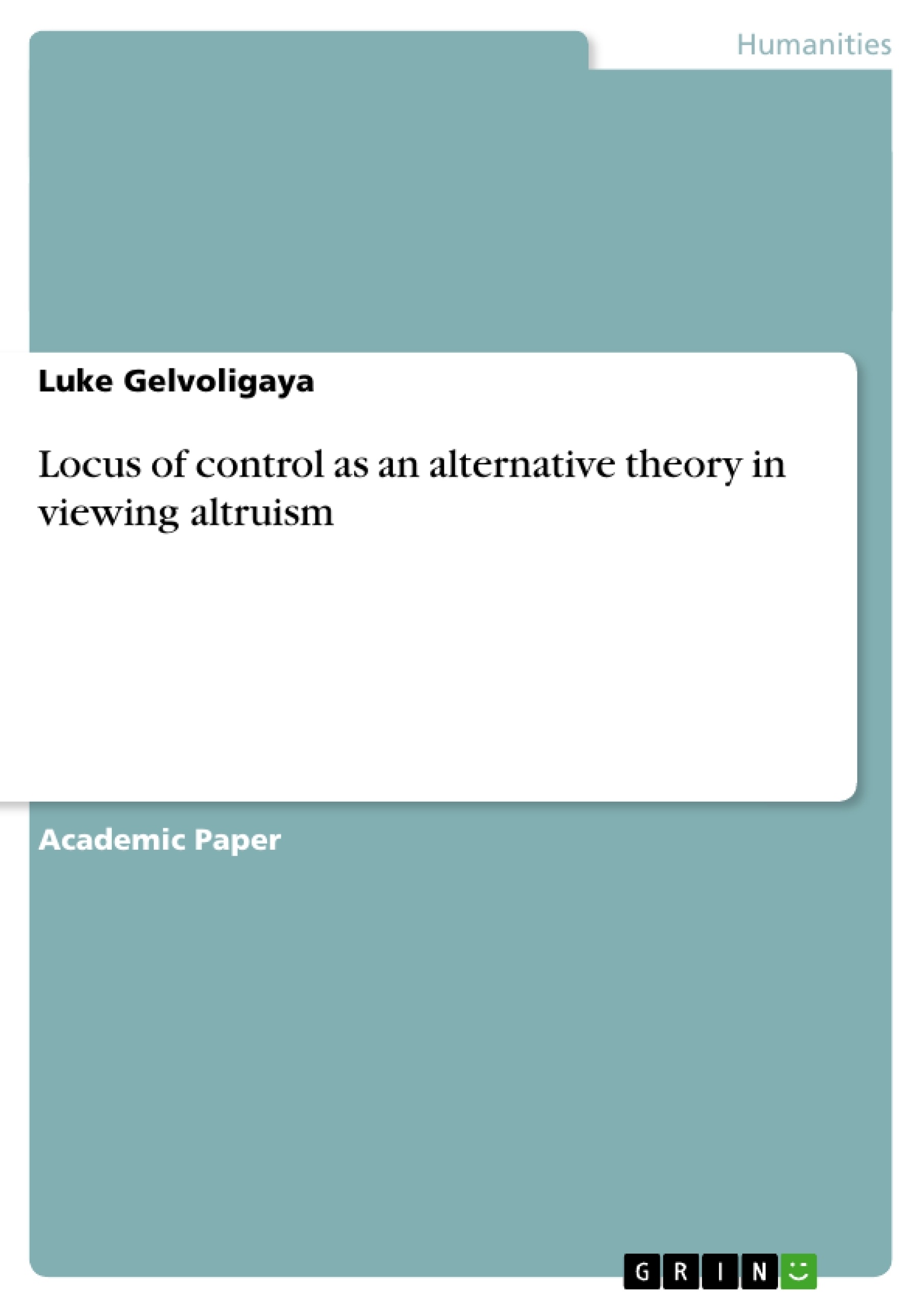Excerpt
ABSTRACT
Existing theories on Altruism include the evolutionary theory composing on the theory of natural selection and the kin selection theory. Theory of natural selection proposes that genes are able form traits which could develop the system of delivering benefits to other individuals. The theory of kin selection explains how individuals gain benefits through reproduction of relatives and from their own reproduction. On the other hand, a separate theory, the theory of rational choice explains altruistic behavior as measurable by the preferences of the individual. These theories are critiqued according to the problems they pose which affect how altruism evolved and developed. An alternative theory is proposed in examining how altruism is viewed among individuals using the locus of control theory by Julian Rotter. The conceptual and methodological assumptions of using locus of control in research are discussed.
Altruism is considered to be a type of social behavior which is defined to be a behavior which could have beneficial increasing fitness or costly decreasing fitness for both the actor and recipient (West, Gardner and Griffin,2007). West and others (2007) defined altruism when behaviour reduces fitness of an actor while increasing the fitness of the recipient. Altruism is differentiated from egoism which according to Rachels (1986) is a behaviour where the person engages in to pursue his or her own selfish interest.
There are lot of studies on altruism, but mostly focus on is evolution among species, mammals and non-mammals. The evolutionary theory, particularly the theory of natural selection explains how altruism evolves along organisms for the enhancement of reproduction and survival.
In this theoretical paper, we would discuss about the different theories which explains the development of altruism. The benefit delivery theory and kin selection theory, both approaches under the evolutionary theory are discussed and critiqued. Another alternative approach, the theory of rational choice is also discussed and critiqued.
Evolutionary Theory: Natural Selection and Benefit delivery
The evolutionary theory explains altruism through the theory of natural selection as first proposed by Charles Darwin. Natural selection is a biological process explaining how genes cause organisms to build traits which increase adaptation and reproductive success (McCullough and Pedersen, 2012). Natural selection’s action on genes can cause the evolution of traits that cause organisms to interact with other organisms in cooperative, generous and even self-sacrificial ways (McCullough and Pedersen, 2012). They used the term benefit delivery devices to refer to the class of biological systems that evolved through natural selection, because of the benefits they cause organisms to deliver to other organisms. The most common study route by which benefit delivery could have evolved in humans via natural selection (Trivers, 1971). The Prisoner’s dilemma, which two players are given a choice to cooperate with or defect against each other illustrates how reciprocity can deliver benefits such that if both players cooperate, they receive moderate benefit; if both defect, they each receive small pay off; and if one player cooperates and one defects, the defector gains a large payoff while the co-operator receives he smallest payoff. (McCullough and Pedersen, 2012)
However, the theory of natural selection on benefit delivery devices poses a problem to the individual delivering the benefits to other individuals. This is because delivering benefits to other organisms prevents the benefit deliverer from using those resources to advance its own reproductive success (McCullough and Pedersen,2012). Another problem pointed out in McCullough and Pedersen (2012) study is that should be impossible for mutant genes that cause organisms to deliver benefits to change those genes which do not possess this trait. Although if this is possible, the benefit delivery trait of the individual would not be permanent as it could be also changed with another set genes containing different traits.
Kin Selection theory
The kin selection theory, discussed by Hamilton (1964) had been one of the known theories which explain altruistic behavior. Kin selection theory shows how individuals gain inclusive fitness or benefit through reproduction of relatives or kin and as well as from their own reproduction. The kin selection provides a framework for understanding social interactions such as altruism, cooperation, aggression, selfishness and spite (Griffin & West, 2003). Hamilton’s (1964) rule states that altruistic behavior is favoured when br > c, where c and b is the cost and benefit respectively and r is the relatedness. The theory on kin selection had been observed to be present in a variety of phenomena such as sterility, avoidance of cannibalism among eusocial insects; however it is also faced with posing problems such that the high relatedness between interacting individuals is insufficient primary evidence for predicting altruism among the kin (Hamilton, 1972).
[...]
- Quote paper
- Luke Gelvoligaya (Author), 2012, Locus of control as an alternative theory in viewing altruism, Munich, GRIN Verlag, https://www.grin.com/document/280132
Publish now - it's free






















Comments